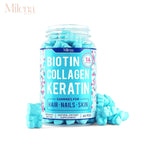Hair Vitamins: A Comprehensive Guide
Hair vitamins have become increasingly popular as more and more people seek ways to improve the health and appearance of their hair. But with so many options available, understanding which vitamins are essential and how they work can be overwhelming. This comprehensive guide will delve into the world of hair vitamins, exploring their benefits, the science behind them, and how to choose the best ones for your individual needs.
Understanding the Science Behind Hair Growth
Before we explore specific vitamins, it's important to understand the basics of hair growth. Hair growth occurs in cycles, and several factors influence this process, including genetics, hormones, and overall health. Vitamins play a crucial role in supporting the hair growth cycle by providing the necessary nutrients for healthy hair follicles.
Key Vitamins for Hair Health
Several vitamins are particularly crucial for hair health. Here are some of the most important ones:
- Biotin (Vitamin B7): Biotin is perhaps the most well-known hair vitamin. It plays a critical role in the production of keratin, a protein that makes up the majority of your hair. Deficiency can lead to hair loss and breakage. However, biotin deficiency is relatively rare, and supplementation might not benefit everyone.
- Vitamin D: Studies suggest a link between vitamin D deficiency and hair loss. Vitamin D plays a role in hair follicle cycling, and adequate levels may promote hair growth.
- Vitamin A: Essential for sebum production (which keeps your scalp and hair moisturized), vitamin A also supports the growth of hair cells. However, excessive Vitamin A can be harmful, so moderation is key.
- Vitamin E: This powerful antioxidant protects hair follicles from damage caused by free radicals, promoting healthy growth and preventing premature aging.
- Vitamin C: An essential antioxidant, vitamin C aids in collagen production, which supports hair structure and strength. It also improves the absorption of iron, another vital nutrient for hair health.
- Iron: Iron deficiency is a common cause of hair loss. Iron is essential for carrying oxygen to the hair follicles, which are necessary for hair growth. If you suspect iron deficiency, consult a doctor.
- Zinc: Zinc plays a vital role in hair tissue growth and repair. It is also important for the synthesis of proteins involved in hair growth.
Choosing the Right Hair Vitamins
With the vast array of hair vitamins on the market, choosing the right one can be daunting. Consider these factors:
- Identify potential deficiencies: Speak to your doctor about getting blood work done to check for any vitamin or mineral deficiencies. This will help you determine what supplements you might need.
- Read labels carefully: Pay attention to the dosage and ingredients of each supplement. Look for products with a balance of essential vitamins and minerals.
- Look for reputable brands: Choose supplements from reputable brands that adhere to strict quality control standards.
- Start with a low dose: It's always best to start with a lower dose and gradually increase it as needed, while monitoring for any side effects.
- Be patient: Results take time. Don't expect overnight miracles. You should see improvements in your hair's health within a few months, depending on your individual needs and the supplement you are taking.
Potential Side Effects and Precautions
While generally safe, hair vitamins can have side effects. These are usually mild and can include digestive upset. It is always best to consult with a healthcare professional before starting any new supplement, especially if you have underlying health conditions or are taking other medications. They can help determine if hair vitamins are right for you and advise on the appropriate dosage.
Beyond Vitamins: Maintaining Healthy Hair
While hair vitamins can support healthy hair growth, they are just one piece of the puzzle. A healthy lifestyle plays a significant role in hair health. Consider these additional tips:
- Maintain a balanced diet: Eat a diet rich in fruits, vegetables, and protein to ensure you're getting enough essential nutrients.
- Manage stress levels: Stress can significantly impact hair health. Practice stress-reducing techniques such as meditation, yoga, or spending time in nature.
- Get enough sleep: Aim for 7-8 hours of quality sleep each night to allow your body to repair and regenerate.
- Avoid harsh hair treatments: Limit the use of heat styling tools, chemical treatments, and tight hairstyles that can damage your hair.
Conclusion
Hair vitamins can be a valuable tool for improving hair health, but they are most effective when combined with a healthy lifestyle. By understanding the science behind hair growth and choosing the right vitamins for your needs, you can work towards achieving healthier, stronger, and more beautiful hair. Remember to always consult your doctor before starting any new supplements.
